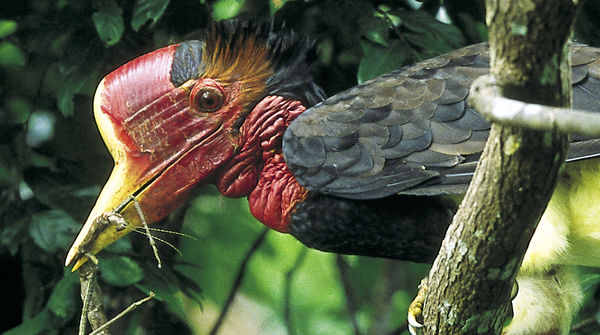The helmeted hornbill (Rhinoplax vigil) has been classified as critically endangered on the IUCN Red List since 2015. The bird, which was once common on Sumatra, has virtually disappeared there, as the IUCN notes.

Helmeted hornbills face a two-pronged threat: poachers and palm oil. Rampant hunting and plantations encroaching on its lowland rainforest habitat are behind the decline.
Poachers hunt the birds for their keratin “casque”, an enlargement of the beak. Unlike other hornbill species, the helmeted hornbill’s casque is solid, making it attractive for carvers and particularly valuable for poachers. There is also a market for the bird’s feathers.
China is the main destination market for the poached bird parts, where the “red ivory” fetches up to $6,150 per kilo. The bird’s casques have been carved into jewelry, ornaments and belt buckles for centuries. Demand has exploded over the past five years, however.
Currently, poachers are focusing on Indonesia: in the year 2013, an estimated 6,000 helmeted hornbills were killed in West Kalimantan alone. They also target juvenile birds, a practice that has an outsize impact on the population. As soon as the supply from Indonesia dwindles, it is expected that the poachers will move on to Malaysia’s forests.
While international trade in hornbill parts has been illegal since 1975, the ban has not helped the birds, it was gathered. Organised crime syndicates operate with impunity and profit handsomely from the trade, which is – in theory, at any rate – punishable by up to five years in prison.
Strict enforcement of the existing laws will be crucial to preventing the helmeted hornbill’s extinction in the very near future, according to the Rainforest Rescue, which has taken up a campaign to save the bird species by demanding that concerned persons sign a call-to-action petition to the governments of Indonesia, Malaysia and China.
The letter reads in part:
To: the governments of Indonesia, Malaysia and China
Ladies and Gentlemen,
Your countries bear great responsibility for the survival of the helmeted hornbill (Rhinoplax vigil). The bird has been classified as critically endangered on the IUCN Red List since 2015.
If you do not act, the species will become extinct in the very near future.
Poaching, which has increased dramatically over the past five years, is driving the helmeted hornbill’s alarming decline. The bird’s casque – an extension of its beak – is in great demand as “red ivory”, fetching up to $6,150 per kilo in China. A further factor is habitat loss due to plantations encroaching on its native lowland rainforests.
While international trade in helmeted hornbill parts has been banned since 1975 (CITES Annex I), trafficking is still rampant. Poachers and criminal traders operate with impunity.
To save this majestic bird from extinction, your countries must work together closely. We call on you to intensify your efforts against the poaching and trafficking of helmeted hornbills.
Yours faithfully,
